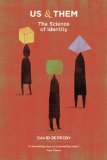Summary | Excerpt | Reviews | Beyond the Book | Readalikes | Genres & Themes | Author Bio

Critics' Opinion:
Readers' Opinion:
First Published:
Oct 2005, 384 pages
Paperback:
Oct 2008, 396 pages
 Book Reviewed by:
Book Reviewed by:
BookBrowse Review Team
Buy This Book
Animals, though, don't make decisions about who is "in" and
who is "out." A dog guards her puppies because they are kin,
and members of her human family because they are friends. But no dog
quits her humans because they have converted to Catholicism or put a
peace sign on the lawn.
People can and will make that sort of change, because people, unlike
animals, make choices based on signs - crosses, uniforms, peace signs,
oaths, and other indicators of a particular human kind. Animals have kin
and animals have friends, but only human beings trust symbols to tell
who is kin and who is a friend.
One August night in New York City in 1997, for example, the crucial
symbol was a tiny piece of metal. A white cop beat up a black man he had
arrested. Later, both men were in the bathroom of the police station,
where the officer spotted a tiny crucifix that his victim wore around
his neck. That was enough to make the cop put away one map of human
kinds and take up another - instead of police against suspect, or white
against black, he now saw two fellow Christians. The officer said he too
believed in Jesus, and apologized.
In Sovu, Rwanda the symbol was a bit of cloth. That
day, Tutsi refugees sought escape from bands of Hutus in Sovu's convent.
The mother superior, Sister Gertrude, called in the Hutu militia.
Hundreds of the Tutsi were shot, hacked, or burned to death. But Sister
Gertrude did not turn over the convent's Tutsi nuns. Their veils
protected them. Seeing this, a nineteen-year-old woman named Aline, the
niece of a nun, begged for a veil. Sister Gertrude refused.
Seven years later, she was convicted in Belgium of war crimes. Among
the witnesses was the murdered niece's mother. "My daughter was
killed because of a little piece of cloth," she said. If humans
are, as the neuroscientist Terence Deacon puts it, the "symbolic
species," then human kinds are among those features that reveal our
uniqueness. A symbolic strip of cloth - its presence saving you from a
pack of rampaging killers, its absence marking you as the kind to kill -
is something only Homo sapiens creates.
But a symbol, like that nun's veil, is meaningless unless it is
understood. If the murderers had thought it was just a bit of cloth, for
example, they would have killed all the Tutsi who wore it. Any activity
that depends on symbols can't be understood without taking into account
the human minds that use those symbols. Imagine trying to get by in
Kinyarwanda, the language shared by Hutu and Tutsi, by treating it only
as a system of sounds - wavelengths and acoustic properties. You
wouldn't get far until you accepted that these sounds meant something,
and found someone to explain what those meanings were.
In the same way, human kinds can't be understood objectively, as a
collection of facts about blood types, skull shapes, average ages,
preferred brands, and so on. Those facts seen from the outside can never
tell what the human kind means. That meaning is made inside the heads of
people who believe in it.
Scientists who study a pack of macaque monkeys can predict who gets
along with whom. Knowing which animals are relatives and which are
allies lets an observer explain the fights and frolics very well. But
"objective" knowledge of human kinds does not. Sister Gertrude
was a Hutu, so you would not be surprised if she had sent all the Tutsi
in the convent to death. Yet she was also a nun, so it's not a surprise
that she saved fellow nuns even though they were Tutsi. She was also a
Christian; it would be admirable and understandable if she had stood, on
religious principles, against the killing of any human being.
Copyright © 2005 by David Berreby. No part of this book maybe reproduced without written permission from the publisher.




Not doing more than the average is what keeps the average down.
Click Here to find out who said this, as well as discovering other famous literary quotes!
Your guide toexceptional books
BookBrowse seeks out and recommends the best in contemporary fiction and nonfiction—books that not only engage and entertain but also deepen our understanding of ourselves and the world around us.